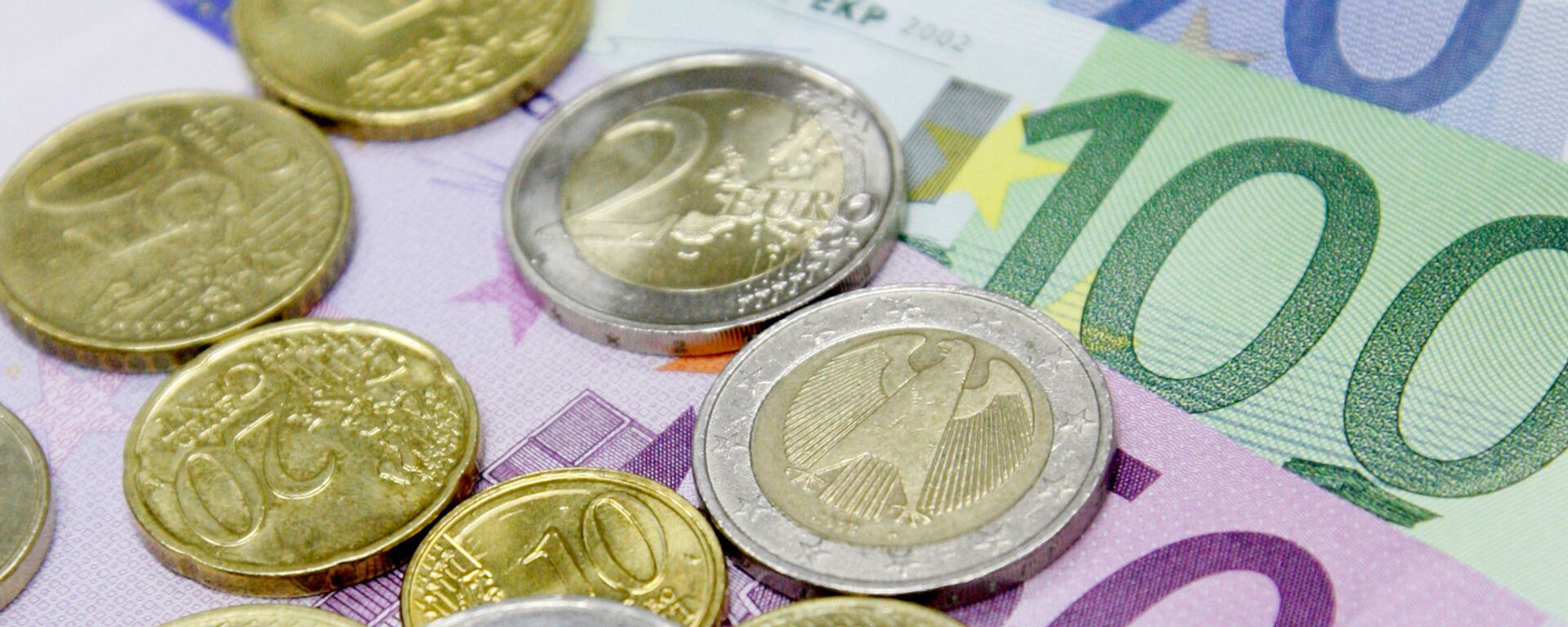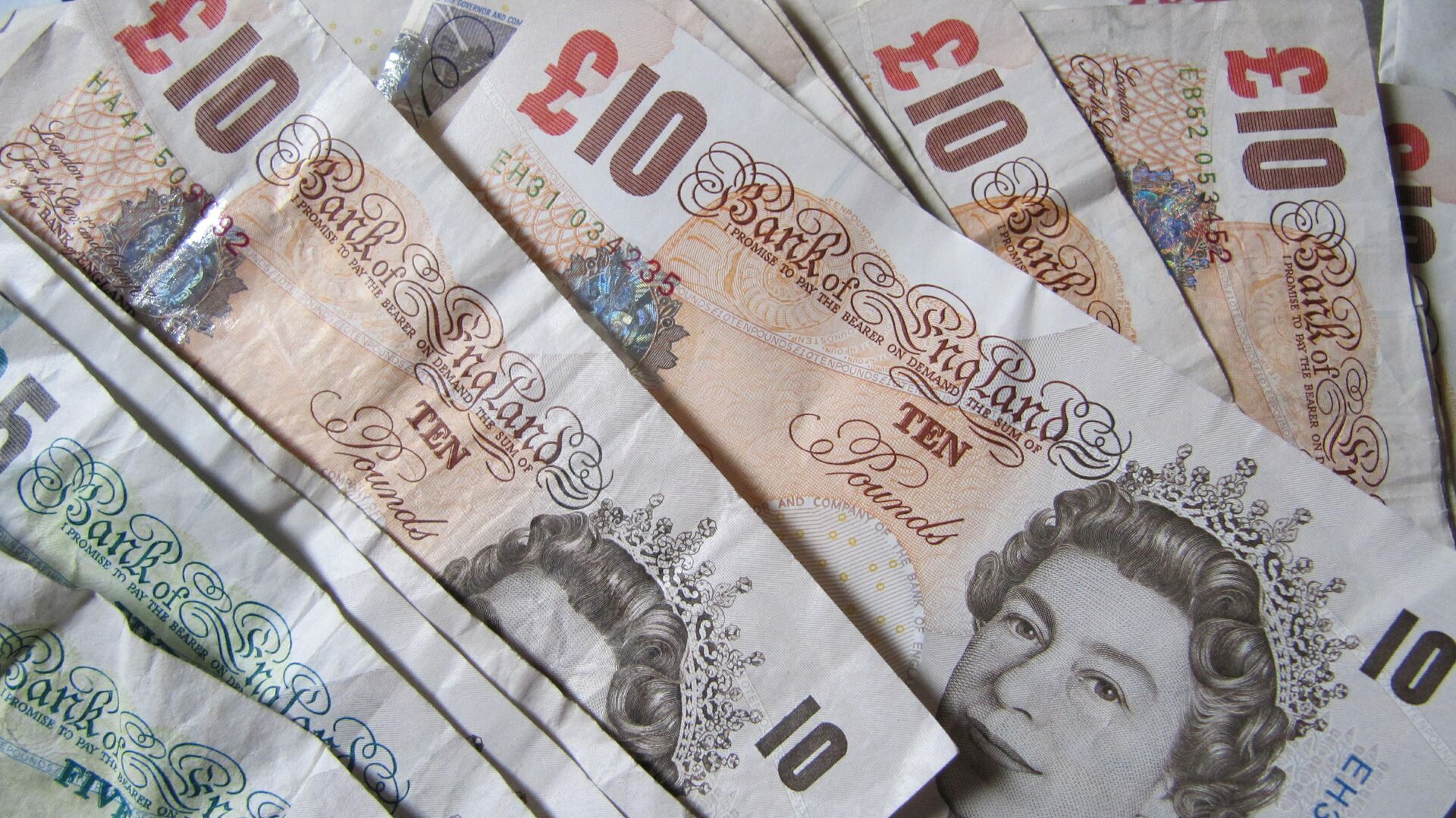https://sputnikglobe.com/20230419/paper-bank-notes-likely-to-decline-become-less-useable-in-future-boe-warned--1109643709.html
Kiss Cash Goodbye? Paper Money to Become 'Less Useable' in Future, BoE Predicts
Kiss Cash Goodbye? Paper Money to Become 'Less Useable' in Future, BoE Predicts
Sputnik International
There is a mass shift from physical money to electronic payments, the Bank of England has underscored, saying that an electronic version of the pound sterling should be developed.
2023-04-19T05:30+0000
2023-04-19T05:30+0000
2023-05-28T15:26+0000
bank of england
cash
digital currency
economy
the european central bank (ecb)
pound sterling
united kingdom (uk)
https://cdn1.img.sputnikglobe.com/img/07e5/0a/14/1090084671_1:0:3642:2048_1920x0_80_0_0_1ba41b7cd0f1e243780365e8174c7b0a.jpg
In the coming years, it will be become increasingly more challenging to spend paper money amid the overwhelming shift to electronic payments, the Bank of England has underscored. In light of this trend, it is imperative to be prepared for that eventuality, and develop an electronic version of the pound sterling, the bank’s deputy governor told the Innovate Finance Global Summit 2023 (IFGS) at London’s Guildhall.Expounding upon what he called a "very clear" move away from physical banknotes to electronic payments, Sir Jon Cunliffe said:Developing a digital pound is what could shore up future confidence in the financial system, insisted Cunliffe.If we look at the timeline of the evolution of payments in England, in 2010 at least 56% of such transactions were made using physical cash. In 2015, this number had dropped to 45%. In 2016, card payments rose to dominance in the retail sector, according to the bank. Within a period of roughly five years, card payments and bank transfers made up 85% of payments. The BoE has predicted that by 2028 no more than 9% of all payments will be made using paper banknotes. Currently, around 90% of people resort to contactless payments, it was emphasized at the IFGS, and close to a third of British adults have gotten used to relying on Apple Pay, Google Pay and similar apps for making mobile payments.According to the bank, even though more and more shops in major cities are adapting to the cashless trend, there is still a demand for physical banknotes, and they will continue to be issued.The warning about the move away from physical cash echoes the comment by Victoria Cleland, Executive Director for Banking, Payments and Innovation of the Bank of England, made nearly two years ago.Victoria Cleland's remark had come as the European Central Bank (ECB) had been working on a digital currency since 2020. Since that time, the bloc has been getting closer to the digitalization of the euro. The European Commission is due to propose a legal framework for the central bank digital currency (CBDC) by May 2023.
https://sputnikglobe.com/20210726/chinas-e-yuan-could-be-largest-threat-to-west-as-us-slow-to-develop-digital-dollar---report-1083461106.html
https://sputnikglobe.com/20230220/how-eu-pushing-ahead-with-digital-euro-amid-de-industrialization-and-us-protectionism-1107632733.html
united kingdom (uk)
Sputnik International
feedback@sputniknews.com
+74956456601
MIA „Rossiya Segodnya“
2023
News
en_EN
Sputnik International
feedback@sputniknews.com
+74956456601
MIA „Rossiya Segodnya“
Sputnik International
feedback@sputniknews.com
+74956456601
MIA „Rossiya Segodnya“
cash is likely to decline, cash will become less useable, transactions, internet commerce, digital payment, move away from physical bank notes, electronic payments, innovate finance global summit, ifgs, digital pound
cash is likely to decline, cash will become less useable, transactions, internet commerce, digital payment, move away from physical bank notes, electronic payments, innovate finance global summit, ifgs, digital pound
Kiss Cash Goodbye? Paper Money to Become 'Less Useable' in Future, BoE Predicts
05:30 GMT 19.04.2023 (Updated: 15:26 GMT 28.05.2023) Weighing in on the evolution of payments back in June 2021, Victoria Cleland, Executive Director for Banking, Payments and Innovation of the Bank of England, stated that the world had moved on "from a time when cash was king," and insisted that digital money could, "contribute to faster, cheaper, and more efficient payments."
In the coming years, it will be become increasingly more challenging to spend paper money amid the overwhelming shift to electronic payments, the Bank of England has underscored.
In light of this trend, it is imperative to be prepared for that eventuality, and develop an electronic version of the pound sterling, the bank’s deputy governor told the Innovate Finance Global Summit 2023 (IFGS) at London’s Guildhall.
Expounding upon what he called a "very clear" move away from physical banknotes to electronic payments, Sir Jon Cunliffe said:
"Cash is likely to decline further and cash itself will become less useable in everyday transactions, for example if internet commerce grows and if merchants increasingly accept only digital payment."
Developing a
digital pound is what could shore up future confidence in the financial system, insisted Cunliffe.
If we look at the timeline of the evolution of payments in England, in 2010 at least 56% of such transactions were made using physical cash. In 2015, this number had dropped to 45%. In 2016, card payments rose to dominance in the retail sector, according to the bank. Within a period of roughly five years, card payments and bank transfers made up 85% of payments. The BoE has predicted that by 2028 no more than 9% of all payments will be made using paper banknotes.
Currently, around 90% of people resort to contactless payments, it was emphasized at the IFGS, and close to a third of British adults have gotten used to relying on Apple Pay, Google Pay and similar apps for making mobile payments.
“Most obviously, what I have called the digitalisation of everyday life will continue. The growth of internet commerce or use of banking and payments apps, for example, is forecast to grow and unlikely to stop,” Cunliffe said.
According to the bank, even though more and more shops in major cities are adapting to the cashless trend, there is still a demand for physical banknotes, and they will continue to be issued.
The warning about the move away from physical cash echoes the comment by Victoria Cleland, Executive Director for Banking, Payments and Innovation of the Bank of England, made nearly two years ago.
"New forms of digital money could contribute to faster, cheaper, and more efficient payments and have financial inclusion as a prominent design consideration," Cleland said in a speech on June 21, 2021.
Victoria Cleland's remark had come as the European Central Bank (ECB)
had been working on a digital currency since 2020.
"A CBDC (central bank digital currency) would, if introduced... be a new form of central bank digital money issued by the Bank of England for use by households and businesses. Importantly, it would co-exist alongside cash, commercial bank deposits, and core payments infrastructure such as RTGS (Real Time Gross Settlement service)," the Executive Director for Banking, Payments and Innovation of the BoE had stated in 2021.
Since that time, the bloc has been getting closer to the digitalization of the euro. The European Commission is due to propose a legal framework for the central bank digital currency (CBDC) by May 2023.

20 February 2023, 15:04 GMT




